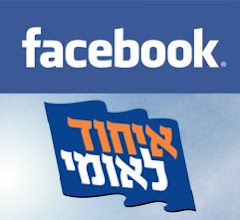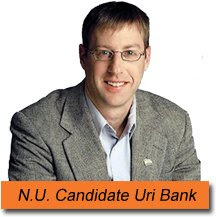 Some 1,700 English speakers crowded into Jerusalem's Great Synagogue Saturday night to hear representatives from nine of the country's leading political parties, in an effort to better grasp their platforms before the upcoming general elections.
Some 1,700 English speakers crowded into Jerusalem's Great Synagogue Saturday night to hear representatives from nine of the country's leading political parties, in an effort to better grasp their platforms before the upcoming general elections. Moderating the panel, which was co-organized with the AACI and the American Israeli Action Coalition, Jerusalem Post Editor-in-Chief David Horovitz invited each of the speakers to begin with a five-minute opening statement about themselves and their parties.
Former Israeli ambassador to the US and Israel Beiteinu candidate Danny Ayalon, the first speaker, la
 unched into an explanation of his party's policy, which draws heavily upon national solidarity.
unched into an explanation of his party's policy, which draws heavily upon national solidarity. "We must restore national pride and national honor," Ayalon told the crowd.
"There are groups here that are not loyal to the state, to its traditions, to its ethics, or to its core being, and they cannot run for the Knesset and afterwards represent our foes, be they Nasrallah, or Hamas," Ayalon said, alluding to the Arab political parties whose participation in the elections was recently challenged.
"There should be a dividing line between those who are loyal to the state and those who are not," he said.
Dr. Bennie Begin, son of the late prime minister Menachem Begin and fifth on the Likud list, spent most of his five minutes deconstructing what he described as the nine false assumptions that have dominated Israel government policies in recent years.
An example, "Number 5, in January of 2006 the Israeli government permits Hamas to participate in the elections of the Palestinian Authority since it cannot win - an assumption proven wrong," he said.
Begin made his final case for the removal of the current government.
"Such a collapse of all basic tenets of policy indicate that these guys must be removed from their position in the government," he said.
Uri Bank, the only American-born candidate on the panel and representative of the right-wing National Union party, spoke next and immediately came out swinging.
"The land of Israel belongs to us and not the Arabs," he said to roaring applause. "We told the decision-makers [at the time], don't pull out of Gaza, because the rockets will start hitting Beersheba, Ashkelon and Ashdod. The leader of Begin's party, Benjamin Netanyahu, raised his hand in favor of the pull-out from Gaza, he enabled that.
"It's a sure thing that Netanyahu will be the next prime minister of Israel, but the question that remains is, what kind of government will he have?" he continued. "With the National Union in his government, we will keep an eye on what kind of decisions he can or cannot make."
Following Bank, Meretz MK Tzvia Greenfield, an Orthodox woman and member of the B'Tselem human rights group, took the stage.
"The three people who have spoken before me are the example of what I am speaking against," she said. "Pessimism, war, death, and more death. I come from a world in which there are other options. I want to present you with an entirely different discussion."
Amid minor heckling from the audience, Greenfield then continued with Meretz's education platform and policy of dialogue with the Palestinians.
Speaking next, Rabbi Prof. Daniel Hershkovitz of the Jewish Home Party outlined his party's belief that three factors - the Torah, the land, and the people, must all come together to create national unity.
"The values of Eretz Yisrael, of Torat Yisrael and of Am Israel [the people of Israel]. These are not three different factors. All these factors form one unity. One cannot exist without the other two." Following Hershkovitz, Green Movement-Meimad leader Rabbi Michael Melchior began his remarks with a parable from the weekly Torah portion.
"When Moses told Pharaoh that the Israelites were leaving Egypt, Pharaoh only wanted to let the men leave. But Moses said, 'No, we're all going, men and women, the boys with the girls.'
"That's the approach we need in Israeli society. There can be no society, no Jewish society, where we differentiate between people. Let's go back to different values, like the environment, education for our children."
Avraham Michaeli of Shas guaranteed his party's ability to help Israeli citizens from all walks of life. As an immigrant from Georgia, Michaeli maintained that he understood the pressure put on new immigrants.
The penultimate candidate was former UJC-Israel director and former IDF spokesman Nachman Shai of Kadima, who set out his party's continuing support for a two-state solution.
"I still believe that we made the right decision in disengaging from Gaza," Shai said, to minor booing from the audience.
"We did it in order to defend Israel and to preserve the Jewish and democratic character of the country. In order to continue that, it is necessary to return to the '67 borders," he said. "We have to find a way to compromise with the Palestinians and with the Arabs."
Joking about her party's "boring but responsible" character, Dr. Einat Wilf, the Labor Party's representative, spoke last.
"We have to find a way to live together, internally and with our neighbors," Wilf said. "With Labor, you get a balance that focuses on public service, health and wealth, and also protects the rule of law.
"It might be boring, it might not be so sexy, but it is responsible. In my opinion, Labor has led Israel through some of the best periods in her history."
From there, the panelists were given the chance to respond to audience questions, which addressed the topics of peace talks with the Palestinians, their vision for Jerusalem, and election reform.
The final question, focusing on the government's response to a nuclear Iran, generated an unprecedented unity among the panelists, who, each in their own way, described that scenario as "unacceptable."
This article can also be read at http://www.jpost.com /servlet/Satellite?cid=1233304645663&pagename=JPArticle%2FShowFull



.jpg)
No comments:
Post a Comment